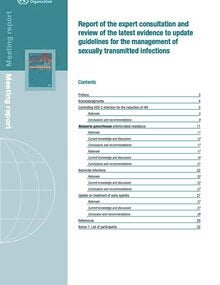The WHO Guidelines for the management of sexually transmitted infections were last reviewed in November 2001, and were published in 2003 (1). This revision focused on the syndromes of genital ulcer disease (GUD) and vaginal discharge – the former because of the observed increase of herpes simplex virus type 2 (HSV‑2) as the main cause of GUD in developing countries, and the latter for its continued complexity and controversy as an entry point for managing cervical gonococcal and chlamydial infections.
Since then, sufficient new data from surveillance and research have become available to merit a review and update of the current guidelines, particularly in the areas of: (1) controlling HSV‑2 infection for the reduction of HIV; (2) Neisseria gonorrhoeae antimicrobial resistance; (3) rapid STI diagnostics; and (4) anorectal infections. WHO convened an expert consultation in April 2008, in Montreux, Switzerland, to review recent data and make recommendations for a new, revised version of the Guidelines for the management of sexually transmitted infections.
The report on this expert consultation focuses on the above‑mentioned topics, and is organized as follows: for each of the four areas, a rationale is given for reviewing the evidence; a summary of findings from the consultation is presented, followed by conclusions and recommendations by the expert group. Data on the use of azithromycin for the treatment of syphilis were presented as well, and are included under the discussion of rapid diagnostic tests for syphilis. These recommendations in turn will inform a revision of the Guidelines for the management of sexually transmitted infections.
|

